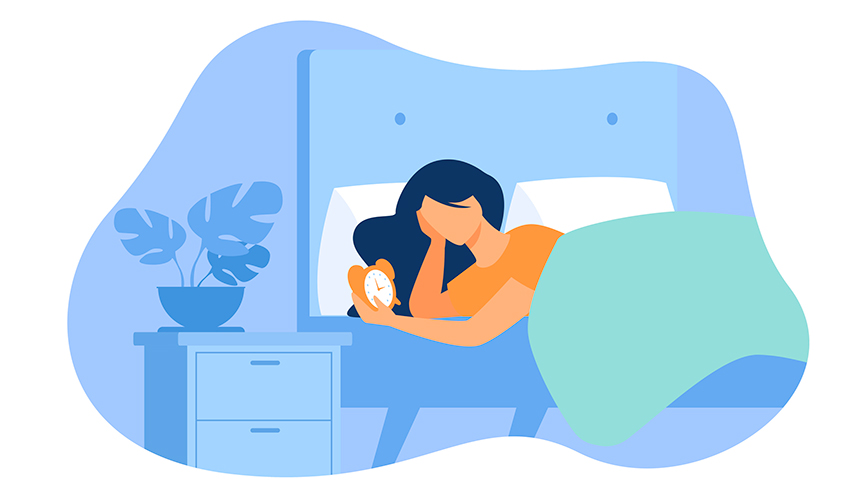You’ve had a busy day, you’re shattered and you fall into bed, waiting for sleep to claim you. But an hour or so later, you’re still waiting. As the night draws on, you turn to the bedside clock and are horrified to see it’s nearly 3am. You have to get up in four hours and know that you’re going to be exhausted tackling the million and one things you need to do the next day. Sound familiar? Although we spend one third of our lives asleep, for many people, sleep proves elusive and it feels like far, far less than this. When we have rested well, we are able to maintain our body’s energy equilibrium and can face the day with optimism.
Modern Life
Sleep deprivation can bring numerous challenges, such as irritability, lack of physical co-ordination, decreased concentration and a weakened immune system, yet very little attention is paid to sleep compared to diet and exercise. This is surprising considering the findings of Sleep Council surveys: that one in five of the UK population (18%) never really sleep well. Professor Chris Idzikowski, director of the Edinburgh Sleep Centre, goes further and claims that a quarter of Britons sleep poorly, coining the term ‘junk sleep’ to describe the burgeoning phenomenon of sleeplessness. Insomnia is often a symptom, not a cause, of an underlying problem and such a high number of sufferers can arguably be attributed to the stress of modern lifestyles and poor diet and exercise habits. Yet this does little to help those who feel themselves to be mentally and physically healthy and adherents of all the universal advice, yet still can’t establish a decent sleeping pattern.
Elusive Sleep
On a personal level, it wasn’t until after I gave birth to my first child that I began to face serious sleep problems. Whilst poor sleep is a common complaint amongst new parents, I was naturally prepared for sleeping less in those first months than I would have liked. But when, at ten months old, my daughter started to sleep through the night, I joyously thought that I too would pass those hours in deep, welcome slumber. But this was not to be – it seems that I was so used to waking through the night that the balance of my body’s natural sleeping rhythms had gone off kilter. Again, I was sure this was common enough and waited to be greeted with a full night’s sleep. Yet night after night I would lie in bed, exhausted, waiting to drop off but often only falling into a light, fitful sleep in the early hours, not long before I had to get up. This was, of course, extremely frustrating as well as draining and I tried countless remedies, therapies and potions to resolve the problem, as well as the more traditional options of warm baths, chamomile tea and lavender oil. In desperation, I even took sleeping pills on one occasion, only to then, to my horror, lie awake all night.
Family Support
Whilst insomnia can of course lead to depression and other health problems, in my case it was the day to day rhythms of my family life that were suffering the most. If I’d had a bad night, my toddler detected this right from the moment I opened her curtains in the morning. Try as I might to be cheerful and energetic, all I really wanted to do was curl up into a ball and sob with frustrated exhaustion. But of course this was not possible, so I dragged my exhaustion into each new day, pulling my daughter down with me. She responded to my lack of energy by being dificult and she had every right to: I was not giving her the love and attention at this important time of day when she was normally at her most playful and energetic. Sometimes things would pick up as the day went on, but at other times, things just went downhill from there. I felt guilty about this state of affairs but this in turn was counter-productive and only extended the chain of negativity.
As far as my relationship with my husband went, whilst he remained supportive of me, I was unwittingly making him feel guilty for his ability to sleep well. Each morning he would be on tenterhooks when I got out of bed, hoping desperately for a smile but more often than not being met with silence or exhausted tears; not exactly a positive start to his day either. Sufice it to say that at the zenith of my insomnia it was an incredibly dificult time for me and my family, compounded by the fact that I could find neither reason nor cure. Whilst not ill, I felt dreadful and found myself becoming increasingly anti-social as well as unable to give my family what they needed.
Counting the Hours
All of us need different amounts of sleep to function well during the day. Sleep experts at Loughborough University carried out extensive trials and found that personal needs are far more important than clocking up a certain number of hours. It’s simply not true that we all need eight hours sleep to function well in the daytime. Margaret Thatcher famously slept for just four, and whilst highly unusual, we only need enough to put us on an even keel. A mistake I made was to obsessively ‘hour count’ each morning. Having decided that I needed a minimum of five hours, if I then notched up my nightly sleep tab and found that I had only had, for example, four and a half hours then that was it – I was not alright and I was going to be exhausted that day. I wonder now if I wouldn’t have felt a little better had I not persisted in my hour counting.
Changing Attitude
Whilst I often still suffer from insomnia, what has changed is my attitude towards it. I spent so many months trying to improve my situation that I was looking outwards, not inwards. It took me a long time to realise this, but what I needed was acceptance; the ability to say ‘Yes, I have a sleeping problem and this is a challenge I need to deal with.’ This may sound like an obvious statement but it was a significant step for me to expend less energy on thinking how to get better and more energy on dealing, in the most accepting way possible, with the problem. My internal dialogue had been running along the lines that if I didn’t sleep, I’d feel terrible and if I felt terrible, I’d take it out on everyone around me and this would have a knock on effect. So I really just had to sleep. Such a burden and pressure is too great for anyone to bear and is counter-productive in trying to ease oneself back into a natural pattern.
I’m certainly not advocating against trying a wide range of remedies: insomnia has many different root causes and as such, each case must be treated uniquely. Try everything that you hear about, you just never know what could provide the answer for your own personal case.
Coping Mechanisms
Whatever you decide to try, give it a decent go. If it’s acupuncture, you need to go to at least several sessions, if it’s eating ‘sleep-inducing’ foods before going to bed such as bananas or dates, try this for a week; if it’s valerian tea (which has been used as a mild sleep aid since 41 AD), according to Varro Tyler from Purdue University School of Pharmacy it takes a couple of weeks for the effects to kick in.
If you feel as though you’ve tried everything and you’re still not sleeping, this is where some vital coping mechanisms need to kick in to get you through the day. As dificult as they may be when all you feel like doing is collapsing, try the following:
- MAKE A LIST RIGHT NOW of activities that make you feel balanced and positive, whether it’s doing a few sun salutations, reading an inspirational quote or looking at a beautiful painting. When you’re feeling at your lowest ebb and most exhausted, take a few minutes out and choose something from your list. It may not take away your exhaustion, but it can help to connect you with your ‘normal’, energised self and remind you of small, everyday pleasures that help us to be human. For me, I found this release in playing or listening to the piano music of Yann Tiersen.
- TRY REALLY HARD TO REMAIN AS POSITIVE as you can with your children, particularly first thing in the morning. Sometimes it can be healthy for them to see you cry as it can help youngsters develop emotional empathy, but a child witnessing their parent visibly distressed day in, day out will bring unwanted anguish.
- ACCEPT HELP IN WHATEVER FORM IT TAKES. Admit that you are struggling and don’t be too proud to ask. One day, the shoe may be on the other foot and it will be you helping out this particular family member, friend or neighbour.
To look at insomnia another way, it’s impossible to really appreciate those good days without the bad. So when those well-rested days do come (and they will come), grab them with both hands and really live. It’s worth mentioning that a large number of creative people were renowned insomniacs: Chopin, Wordsworth and Van Gogh to name a few. Perhaps through your insomnia you can even unlock some of your latent creativity. You may never be one of those enviable people who fall asleep the minute their head hits the pillow, but you will sleep enough hours to feel able to face the day calmly. Take heart that a peaceful night’s slumber is the natural state of the human race and rest assured (no pun intended!) that it will come again.
“If you feel as though you’ve tried everything and you’re still not sleeping, this is where some vital coping mechanisms need to kick in to get you through the day”
What To Do
- The National Sleep Foundation advises going to bed at the same time each night and having some kind of wind down routine to help set the internal body clock. Think about children; they thrive on bedtime routines and often adults are no different. Take at least half an hour before bedtime to unwind and stick to this. The Sleep Council extends this, advocating the 4 R’s of good sleep: Regularity (of bedtimes and rising times, regardless of how tired you are), Routine, Restful bedroom (ie limiting the use of computer and television in your room) and Right bed.
- Turn your bedside clock away from you or move it to another room so you’re not watching the hours tick by during the night. Clock watching will only make you feel more desperate to sleep, thereby decreasing the likelihood of it happening.
- If you feel you’ve been tossing and turning for some time, then get up and change your environment. Just going to the bathroom or listening to some relaxing music (one friend swears by Chopin for promoting relaxation) in another room can help you feel calmer for returning to bed. It’s not a good idea to put on a bright light however. The neurochemical hormone melatonin is released at night which helps us to fall and remain asleep, turning on a bright light can set this back.
- A mental exercise to try in bed is to run through the events of the day backwards in your mind, as though rewinding a film, starting with the moment you get into bed. Do this evenly and dispassionately, without dwelling on or judging any particular moments.
- If you are in a position to do this, ask someone to read to you before you turn the light off, or (if they are prepared to do this!) during the night when you’re unable to drop off. This can prove wonderfully relaxing.







